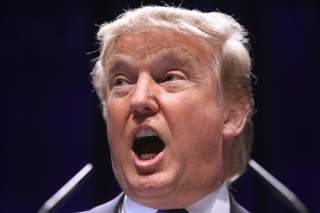Trump's Town-Hall Surge
National-security experts should be delighted that there is any debate at all.
Donald Trump and Hillary Clinton may not have formally faced off against each other yesterday night, but the town-hall format that they appeared in offered a foreshadowing of what is to come at their vaunted first debate on September 26. Trump was weak on details, but strong on his presentation. He is well suited to what former ambassador Richard Burt has called a “foreign policy by bumper sticker” debate. If anything, Trump was the winner last night—and he may well have raised expectations for his performance in the upcoming debates.
The rumbustious Trump extolled his promise of a thirty-day order for wiping out the Islamic State (without divulging any details about his plans for taking out ISIS) and took shots at the current military leadership (“reduced to rubble”), while Clinton remained firmly planted in the details, including becoming mired once more in the bog of her email controversies, an issue that is unlikely to go away even if she wins the presidency. Indeed, Andrew C. McCarthy, writing in National Review, is now calling for the immediate, preemptive impeachment of Clinton so as to disqualify her from running for the presidency.
Whether the verbal fisticuffs between Trump and Clinton will really sway many voters is an open question. Absent a fresh terrorist attack in America itself, foreign policy is unlikely to come close to challenging domestic issues for preeminence. But of the two candidates, Trump clearly remains the far more unorthodox one. He made it abundantly clear that he isn’t backing down on the foreign-policy stands that he enunciated during the campaign. He wrongly claimed that he had opposed the Iraq War and depicted Hillary Clinton as a reckless warmonger, eager to intervene whenever and wherever should could. At the same time, Trump declared earlier in the day in a speech in Philadelphia that he would embark upon a Reaganesque buildup of the American military. “I will ask Congress to fully eliminate the defense sequester and will submit a new budget to rebuild our military,” he said. This is a stance that should appeal to the defense hawks in the GOP.
But Trump’s insouciant remarks about Russia and Vladimir Putin are unlikely to go over as well in the GOP. Once again he said, “I think I would have a very, very good relationship with Putin, and I think I would have a very, very good relationship with Russia.” He also noted, “If he says great thing about me, I’m going to say great things about him.” The truth is that Putin has not said “great” things about Trump, at least so far. Trump’s stand appears to be predicated on the notion that he could forge a new relationship with Putin that would allow the U.S. and Russia to forge a grand alliance to smash terrorism in the Middle East. What the details of such an arrangement would consist of he left unsaid, other than touting his skills as a negotiator.
Nevertheless, Trump’s performance yesterday should ease concerns in the GOP over his debates against Clinton. If last night’s performance is anything to go by, he may even come out ahead in the debate, because he has a much greater ability to play to the camera than she possesses. He can brazen it out. Clinton can’t. Clinton is dry, analytical, parsing—in short, lawyerly. Michael M. Grynbaum noted that Trump is “Houdini-like” in his ability to wriggle out of uncomfortable questions. Trump’s ability to project broad, sweeping themes should serve him well. In addition, he will likely double down on the notion that he will sweep out the old foreign-policy order, which is why Republican grandees like George Shultz and Henry Kissinger aren’t endorsing him.
In one sense, however, the fixation with Clinton’s emails could benefit her. It overshadows any real discussion of her actual foreign-policy record, which, as Professor David Bromwich has noted in the National Interest, is an awfully shaky one. If the electorate becomes numbed by the anfractuosities of her emails—prolonged parsing of what is “confidential,” “secret” and so forth—she can evade her record of voting for the Iraq War or supporting the war in Libya, not that Trump will try to let her forget it.
For all the tut-tutting among the foreign policy elite about Trump’s rise, national-security experts should be delighted that there is any debate at all about foreign policy. By unceremoniously questioning the liberal order that has prevailed over the past decades, Trump is prompting another look at America’s role in the world. Even if he fails to gain the presidency, the question that will hover over American foreign policy in coming years is whether Trump was a one-off or whether he represents a looming populist upheaval.
Jacob Heilbrunn is editor of the National Interest.
Image: Donald Trump speaking at CPAC 2011 in Washington, DC. Flickr/Gage Skidmore

